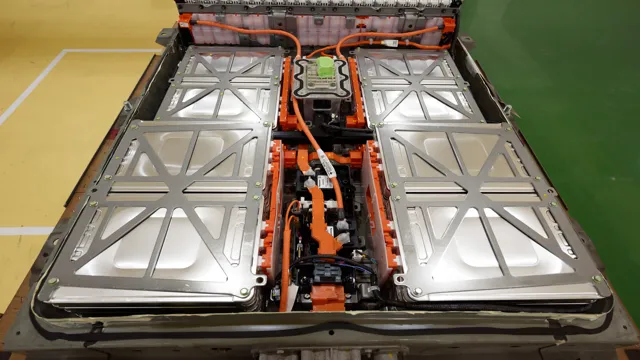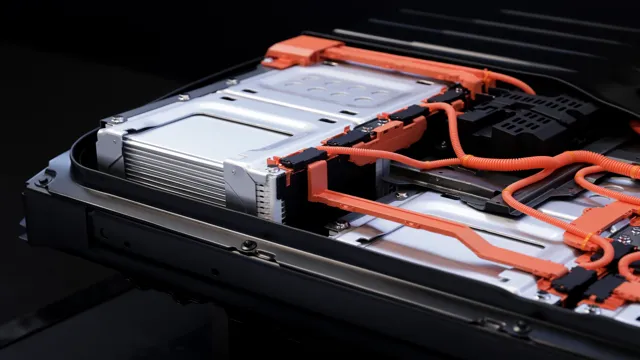Unleashing the Power: A Comprehensive Comparison of Electric Car Battery Capacities
Are you thinking about purchasing an electric car? One of the most important factors to consider is the battery capacity. This can have a significant impact on your daily driving range, charging times, and overall cost-effectiveness. With so many different electric car models and battery sizes available, it can be overwhelming to compare and make a decision.
In this blog, we will provide a comprehensive comparison of electric car battery capacities. You will discover which factors influence battery capacity, such as car size, weight, and efficiency. We will also break down the top electric car brands and their battery size options, including Tesla, Nissan, Toyota, and more.
By the end of this blog, you will have a clearer understanding of the variance in electric car battery capacities and which ones fit your needs. You’ll also learn how to calculate your daily driving range based on battery capacity and charging times. Don’t miss out on this essential information before making your electric car purchase.
Let’s dive in!
Introduction
Are you considering purchasing an electric car, but not sure about the battery capacity and range? Choosing the right electric car battery is crucial when it comes to driving range, and it’s essential to compare your options before making a final decision. A good starting point is to compare the battery capacities of different electric cars, as this can give you an idea of the potential range you can expect. Some compact electric cars have batteries with a capacity of around 30-kilowatt hours (kWh), while some larger electric SUVs and trucks can have battery capacities of up to 100 kWh.
While battery capacity is not the only factor that determines driving range, it’s one of the most important, and taking a closer look at this comparison can help you make a more informed choice when selecting your electric vehicle.
Why Battery Capacity Matters
Battery capacity is a crucial factor to consider when it comes to electronic devices, but why does it matter so much? Well, put simply, it determines how long your device can last before needing a recharge. Whether you’re using your phone to scroll through social media, watch videos, or take pictures, a low battery can be incredibly frustrating. In fact, it’s common for people to experience “range anxiety” – the fear of their device’s battery dying before they can access a charger.
The higher the battery capacity, the longer you can use your device without worrying about it going dead. So, if you’re someone who relies heavily on your electronic devices throughout the day, investing in a device with a higher battery capacity might be a smart move.
Electric Car Battery Capacities
When it comes to electric cars, the battery capacity is a crucial factor. The battery capacity of an electric car determines how far it can travel on a single charge. Nowadays, there are various electric car models on the market with different battery capacities.
For example, the Tesla Model S has a battery capacity of up to 100 kWh, which translates to a range of about 402 miles on a single charge. Compare that to the Nissan Leaf with a battery capacity of 40 kWh, which can only travel up to 150 miles on a single charge. And then there are electric vehicles like the BMW i3, which has a battery capacity of 4
2 kWh and can travel up to 153 miles on a single charge. Ultimately, the electric car battery capacity comparison is a key factor to consider when choosing an electric car. It all depends on how far you need to travel on a regular basis and what your budget is.
Tesla Model S
The Tesla Model S is one of the most popular electric vehicles on the market today, with good reason. One of the key factors contributing to its appeal is its battery capacity. Tesla Model S batteries come in three different sizes: 75 kWh, 100 kWh, and 130 kWh.
The 75 kWh battery offers a range of approximately 370 miles on a single charge, while the 100 kWh battery offers a range of around 400 miles. The largest battery, the 130 kWh, is reserved for the Model S Plaid+, which boasts a range of over 520 miles. These impressive numbers mean that Model S drivers can take long trips with confidence, without worrying about running out of battery charge.
Plus, with access to Tesla’s extensive Supercharger network, recharging is fast and convenient. If you’re considering purchasing a Model S, be sure to carefully consider which battery size is right for your needs.
Nissan Leaf
The Nissan Leaf is one of the most popular electric cars in the market, and when it comes to battery capacity, there are a few different options to choose from. The 2011-2012 models come with a 24 kWh battery, while the 2013-2015 models have a 30 kWh battery, and the 2018 model boasts a 40 kWh battery. The larger the battery capacity, the more range the car has, and the 40 kWh battery can provide up to 150 miles on a single charge.
Of course, this can depend on various factors such as driving style, temperature, and terrain. If you’re looking for a reliable electric car that won’t break the bank, the Nissan Leaf with a 30 or 40 kWh battery could be a great option. Not only is it eco-friendly, but it’s also comfortable, spacious, and packed with all the latest tech features.
Whether you’re commuting to work or taking a road trip, the Nissan Leaf is the perfect companion.
Chevrolet Bolt
When it comes to electric cars, one of the most important factors to consider is battery capacity. The Chevrolet Bolt is a popular electric car that boasts a 66-kWh battery, which allows it to travel up to 259 miles on a single charge. This is a significant improvement over its predecessor, the Chevy Volt, which had a 16-kWh battery and a range of only 53 miles.
With its impressive battery capacity, the Bolt is able to compete with other popular electric cars like the Tesla Model 3 and the Nissan Leaf. In addition to its battery capacity, the Bolt also offers fast-charging capabilities, allowing drivers to recharge up to 90 miles in just 30 minutes. Overall, the Chevy Bolt is a great option for those who are looking for a reliable and efficient electric car with a long range and fast charging capabilities.
BMW i3
The BMW i3 is a popular electric car that has been gaining traction in recent years. One of the most important aspects of an electric car is its battery capacity, as it determines how far the car can go between charges. The BMW i3 comes with two different battery capacities: a 4
2 kWh battery and a 120 Ah battery. The 42 kWh battery has a range of around 153 miles on a single charge, while the 120 Ah battery has a range of around 190 miles on a single charge.
This makes the i3 a great option for those who want an electric car that can go the distance. Additionally, the i3’s batteries are designed to be fast-charging, meaning that you can get up to 80% of your battery’s charge in just 40 minutes. Overall, the BMW i3 is a great choice for anyone who wants an electric car that is both practical and efficient.
Ford Mustang Mach-E
The Ford Mustang Mach-E is an exciting new electric car that has caught the attention of drivers everywhere. One of the most important aspects of any electric car is its battery, and the Mach-E does not disappoint in this regard. It comes with a choice of two battery options: a standard-range battery and an extended-range battery.
The standard battery has a 75 kWh capacity, while the extended battery has a 98 kWh capacity. This means that with the extended-range battery, you can drive up to 300 miles on a single charge. That’s enough for most people to go a full week without having to worry about recharging their car.
With the standard battery, you’ll get about 230 miles of range, which is still pretty impressive. Whether you choose the standard or extended-range battery, you’ll be getting a great electric car that is fun to drive and eco-friendly.
Battery Capacity Comparison
If you’re in the market for an electric car, then you’re probably concerned about the battery capacity and how far it will take you on a single charge. The average electric car battery capacity ranges between 40 kWh to 100 kWh, with the Tesla Model S boasting a whopping 100 kWh battery capacity. The Nissan Leaf, on the other hand, has a battery capacity of 40 kWh, which means it can travel around 150 miles on a single charge.
However, the range of an electric car varies depending on various factors, including driving style, terrain, and temperature. So, it’s essential to do your research before purchasing an electric car to ensure you get the battery capacity you need for your daily commute or long road trips.
Capacity in Miles per Battery Charge
Battery capacity is a critical aspect to consider when choosing an electric vehicle. It determines the distance the car can travel on a single battery charge. With a higher capacity, the vehicle can cover more miles without needing to recharge.
The capacity varies depending on the car model and the battery technology used. For instance, a Tesla Model S Long Range can cover up to 402 miles, while a Nissan Leaf can only cover 149 miles on a single charge. However, it is essential to note that the capacity may be affected by factors such as driving habits, weather, and speed.
Therefore, it is crucial to consider your driving needs and choose a vehicle with an adequate range to cater for your travel distance. Additionally, as battery technology improves, vehicles with higher capacities are expected to emerge, providing even longer ranges for longer trips.
Capacity in Kilowatt Hours
When it comes to batteries, understanding capacity can be a bit confusing, especially when we’re talking about kilowatt hours (kWh). The capacity of a battery refers to how much energy it can store, and kW is a measure of how quickly it can discharge that energy. So when we measure battery capacity in kWh, we’re looking at how much energy it can provide over a certain amount of time.
It’s important to compare battery capacity when choosing a battery because different batteries have different capacity ratings, which affects how long and how well they can power your devices or home appliances. For example, one battery might have a capacity of 5 kWh, while another might have a capacity of 10 kWh. The battery with the higher capacity will be able to power your devices for longer than the one with the smaller capacity.
So when choosing a battery, it’s important to consider your needs and how much energy you need to power your home or devices effectively.
Conclusion
In conclusion, comparing the capacity of electric car batteries is like a game of “who’s got the biggest battery?” But as we all know, size isn’t everything. It’s also about how efficiently you use that energy to get from point A to point B. So while some electric car batteries may have larger capacities than others, the real test of a great electric car is how well it manages that energy and delivers an eco-friendly driving experience.
Just remember, it’s not always about the size of your battery, but how you use it.
FAQs
What is the average battery capacity of an electric car?
The average battery capacity of an electric car is around 60 kWh.
Which electric car has the highest battery capacity currently available in the market?
Tesla Model S has the highest battery capacity of 100 kWh, currently available in the market.
Are the battery capacities of electric cars improving every year?
Yes, the battery capacities of electric cars are improving every year with advancements in technology.
Do electric cars with higher battery capacities offer longer driving ranges?
Yes, electric cars with higher battery capacities offer longer driving ranges as they can store more energy to power the car.





